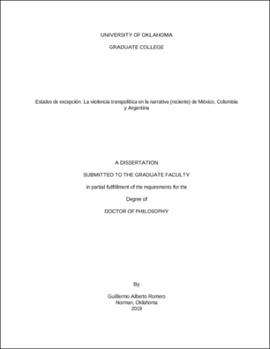| dc.contributor.advisor | Rioseco, Marcelo | |
| dc.contributor.author | Romero Pedroza, Guillermo Alberto | |
| dc.date.accessioned | 2019-05-31T22:13:22Z | |
| dc.date.available | 2019-05-31T22:13:22Z | |
| dc.date.issued | 2019-05-10 | |
| dc.identifier.uri | https://hdl.handle.net/11244/320191 | |
| dc.description.abstract | In the last decades, the political violence that characterized the first half of the twentieth century in Latin America has mutated, becoming a daily phenomenon and, therefore, invisible, that exemplifies what Jean Baudrillard has called trans political violence. The institutional, political, economic, and social changes that occurred in Latin America through the 1970’s and 1980’s, especially those developed under the regime of dictatorial governments, contributed to create the appropriate conditions for the implementation of the processes of economic liberalization and global market –as part of the concept of institutional modernization and cultural globalization– that gave rise to the neoliberal mentality. Neoliberalism becomes hegemonic as a mode of discourse, and is incorporated into the way people understand, interpret and live in the world. Its integration into a globalized society has promoted changes in the forms of labor, in social relations, as well as the dismantling of welfare necessities; more importantly perhaps, it has motivated the rise of new forms of contemporary violence which develop and nurture themselves from the political and economic opportunities that neoliberalism creates. In fact, the result of this process are precarious forms of life that especially affect the poorest levels of society.
This work will present a theoretical approach to the concept of violence and will focus on its trans political manifestation, as a specifically contemporary form of violence produced in a context characterized by very particular historical, political, and social conditions. Subsequently, we will analyze the literary representation of this form of violence in a group of contemporary Latin American novels, belonging to a canon that we have called literature of violence. Through the study of works by Mexican Elmer Mendoza, Colombian Fernando Vallejo, and Argentinian Laura Alcoba, Elsa Osorio y Leopoldo Brizuela, in which each author approaches literarily a specific form of violence in their country, we will analyze the way in which these specific forms of violence (narco-violence in Mexico and Colombia and State violence in Argentina) give way to the trans political violence as it has been conceptualized by Baudrillard. Likewise, we will differentiate the way in which each form of violence is represented literarily. | en_US |
| dc.language | es | en_US |
| dc.rights | Attribution-NonCommercial-NoDerivatives 4.0 International | * |
| dc.rights.uri | https://creativecommons.org/licenses/by-nc-nd/4.0/ | * |
| dc.subject | Estados de excepción | en_US |
| dc.subject | Latin American Literature | en_US |
| dc.subject | Literatura latinoamericana | en_US |
| dc.subject | Violencia | en_US |
| dc.subject | Violencia transpolítica | en_US |
| dc.title | Estados de excepción. La violencia transpolítica en la narrativa (reciente) de México, Colombia y Argentina | en_US |
| dc.contributor.committeeMember | Cortest, Luis | |
| dc.contributor.committeeMember | Wray, Grady C. | |
| dc.contributor.committeeMember | Colín, José Juan | |
| dc.contributor.committeeMember | Hirschfeld, Tassie | |
| dc.date.manuscript | 2019-05-05 | |
| dc.thesis.degree | Ph.D. | en_US |
| ou.group | College of Arts and Sciences::Department of Modern Languages, Literatures, and Linguistics | en_US |
| shareok.nativefileaccess | restricted | en_US |

